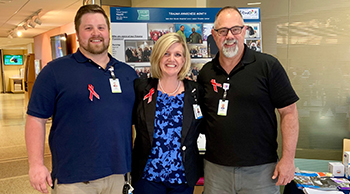
From left: TSN peer volunteer Dylan Lindhahl, Kimberly Rivera, YNHH Trauma Programs Coordinator, and TSN peer volunteer John Redfield.
YNHH joins network to help trauma survivors rebuild their lives
Every year, approximately 4,000 patients are treated at Yale New Haven Hospital after experiencing a traumatic injury that will permanently affect their lives. Many wonder what the future will hold as they recover.
The Trauma Survivors Network (TSN) at YNHH can answer these questions and provide a path to a “new normal.” A program of the American Trauma Society, the TSN is a national network that connects survivors and their families with others who have sustained similar injuries. YNHH is the only TSN-affiliated facility in Connecticut.
“As one of just two level 1 trauma centers in the state, YNHH had over 3,900 trauma team activations last year alone; more than 730 of those were full traumas,” said Joseph Mendes, PA-C, director of Trauma Programs and Surgical Services. “We joined the Trauma Survivor Network to substantially improve the way we deliver trauma recovery care. It’s part of an effort to provide additional psychological support and improve outcomes that are not solely related to trauma-related injury.”
“Hospitalization following a traumatic injury can be filled with uncertainty, pain, anxiety and frustration. A traumatic injury can alter life in an instant, and recovery can be long and challenging,” said Kimberly Rivera, Trauma Programs coordinator. “Our goal is to provide programs and resources for patients and families as they work to rebuild their lives.”
The TSN offers resources such as a patient/family handbook, peer support groups, multiple online programs and a Peer Visitation Program that connects trauma patients with trauma survivor volunteers. YNHH’s Peer Visitation Program recently launched with seven volunteers.
“They have all lived through the trauma experience themselves, including the rescue scene, hospitalization, rehabilitation and return home,” Rivera said.
“They understand the concerns of new trauma patients on a deeply personal level.”
John Redfield of Manchester, one of the TSN volunteers, was already visiting with trauma patients as part of YNHH’s amputee support group. Redfield lost his leg in a motorcycle accident in 1991.
“I talk to new amputees about what will be possible in six months, in a year and for the long term,” he said. “It takes away the unknown. Seeing me helps them visualize what their lives can and will be like.”
Dylan Lindhahl, a TSN peer volunteer who experienced a life-altering burn injury, believes the program is important for patients and their families.
“Traumas impact the home life for everyone. I can answer family members’ questions and help them understand where their loved one is coming from, emotionally and mentally, after an injury.”
Providers can request peer visitors for trauma and amputee patients via a referral tab in Epic using this pathway: Manage orders, TSN search, order set and reason for consult. For more information, contact Kimberly Rivera, 203-688-3261 or
[email protected].

